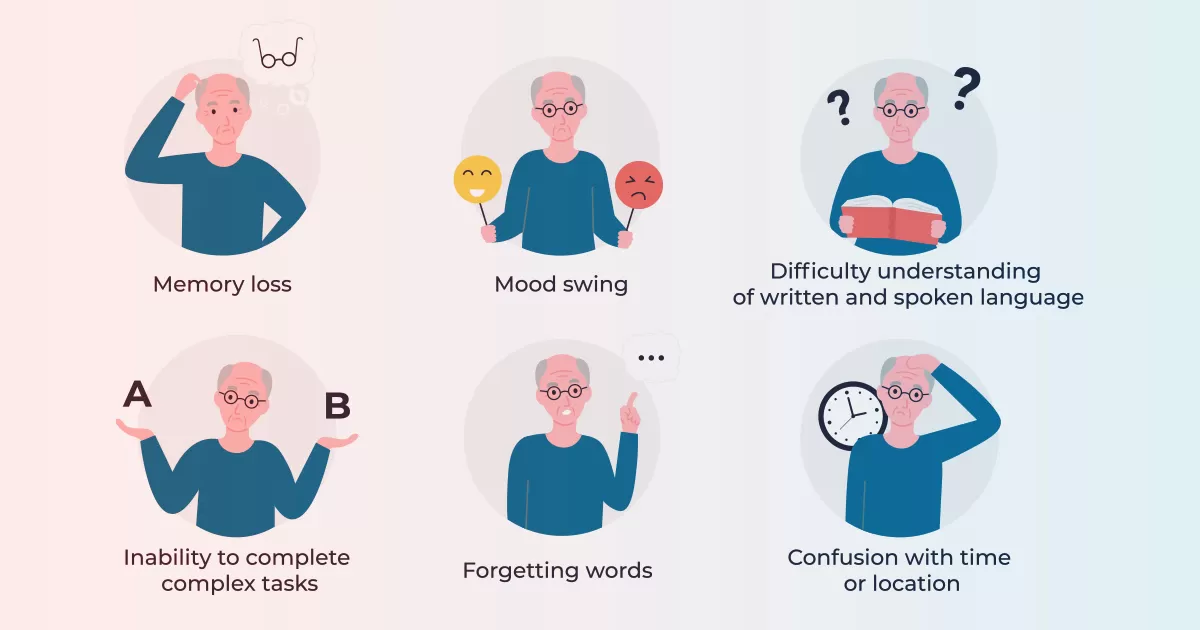
Alzheimer’s disease is a progressive neurodegenerative disorder that affects millions of people worldwide. It is the most common cause of dementia, characterized by a decline in cognitive function and memory loss. Despite decades of research, the exact cause of Alzheimer’s remains elusive. However, scientists have identified several factors that contribute to its development. In this blog, we will explore the causes, symptoms, and risk factors associated with Alzheimer’s disease.
Causes of Alzheimer’s Disease
Alzheimer’s disease is primarily characterized by the accumulation of two abnormal protein fragments in the brain: beta-amyloid plaques and tau tangles. These protein aggregates disrupt communication between nerve cells and ultimately lead to their death. The exact reasons behind the formation of these plaques and tangles are not fully understood, but researchers believe that a combination of genetic, environmental, and lifestyle factors play a role.
Genetic Factors
Genetics plays a significant role in the development of Alzheimer’s disease. Mutations in certain genes, such as the amyloid precursor protein (APP), presenilin 1 (PSEN1), and presenilin 2 (PSEN2) genes, have been linked to early-onset familial Alzheimer’s disease. However, these genetic mutations account for only a small percentage of Alzheimer’s cases. Most cases of Alzheimer’s are sporadic and likely involve a complex interplay of genetic and environmental factors.
Environmental Factors
Several environmental factors have been implicated in the development of Alzheimer’s disease. These include exposure to toxins, head injuries, and chronic stress. Some studies suggest that air pollution, heavy metals, and pesticides may increase the risk of developing Alzheimer’s by promoting inflammation and oxidative stress in the brain. Additionally, traumatic brain injuries, such as those sustained in car accidents or sports-related concussions, have been linked to an increased risk of dementia later in life.
Lifestyle Factors
Certain lifestyle factors may also influence the risk of developing Alzheimer’s disease. These include diet, exercise, smoking, and alcohol consumption. A diet high in saturated fats and processed foods has been associated with an increased risk of cognitive decline, while a Mediterranean-style diet rich in fruits, vegetables, and omega-3 fatty acids may help protect against Alzheimer’s. Regular physical exercise has been shown to improve cognitive function and reduce the risk of dementia. Conversely, smoking and excessive alcohol consumption can damage the brain and increase the risk of Alzheimer’s disease.
Symptoms of Alzheimer’s Disease
Alzheimer’s disease typically progresses slowly over several years, with symptoms worsening over time. Early signs of Alzheimer’s may include:
- Memory loss, particularly short-term memory
- Difficulty performing familiar tasks
- Disorientation and confusion, especially regarding time and place
- Challenges with problem-solving and planning
- Language problems, such as difficulty finding words or following conversations
- Changes in mood or behavior, such as depression, anxiety, or agitation
- Loss of interest in previously enjoyable activities
- Withdrawal from social interactions
As the disease progresses, individuals may experience more severe symptoms, such as hallucinations, delusions, and difficulty swallowing. In the later stages of Alzheimer’s, individuals may require round-the-clock care and assistance with basic activities of daily living.
Risk Factors for Alzheimer’s Disease
While the exact cause of Alzheimer’s disease remains unknown, several risk factors have been identified:
A. Age: Advanced age is the greatest risk factor for Alzheimer’s disease. The risk of developing Alzheimer’s doubles every five years after the age of 65.
B. Family History: Individuals with a family history of Alzheimer’s are at an increased risk of developing the disease, particularly if a first-degree relative, such as a parent or sibling, has been diagnosed.
C. Genetics: Certain genetic mutations, such as those in the APP, PSEN1, and PSEN2 genes, increase the risk of early-onset familial Alzheimer’s disease. However, these mutations are rare and account for only a small percentage of Alzheimer’s cases.
D. Down Syndrome: Individuals with Down syndrome have an increased risk of developing Alzheimer’s disease, often at an earlier age than the general population.
E. Cardiovascular Health: Conditions that affect cardiovascular health, such as high blood pressure, diabetes, obesity, and high cholesterol, have been associated with an increased risk of Alzheimer’s disease.
F. Lifestyle Factors: Poor diet, lack of exercise, smoking, and excessive alcohol consumption can all contribute to an increased risk of Alzheimer’s disease.
Alzheimer’s disease is a profound challenge, affecting not just individuals diagnosed but their families and communities as well. While the exact cause of Alzheimer’s remains elusive, ongoing research continues to shed light on its complexities. By understanding and addressing the multitude of factors that contribute to its development, we can strive to lessen its impact and provide better support for those affected.
In this journey, Shinon Healthcare stands as a pillar of support and compassion. Through our dedication to specialized memory care programs, attentive staff, and innovative approaches, Shinon Healthcare extends a comforting hand to individuals navigating the challenges of Alzheimer’s. Our commitment to fostering an environment of dignity and understanding is a beacon of hope for families seeking solace and assistance on this difficult path. As we collectively endeavor to confront Alzheimer’s disease with empathy and resilience, let us remember the importance of solidarity and compassion in supporting those affected. Together, we can make a difference in the lives of individuals living with Alzheimer’s and their loved ones.